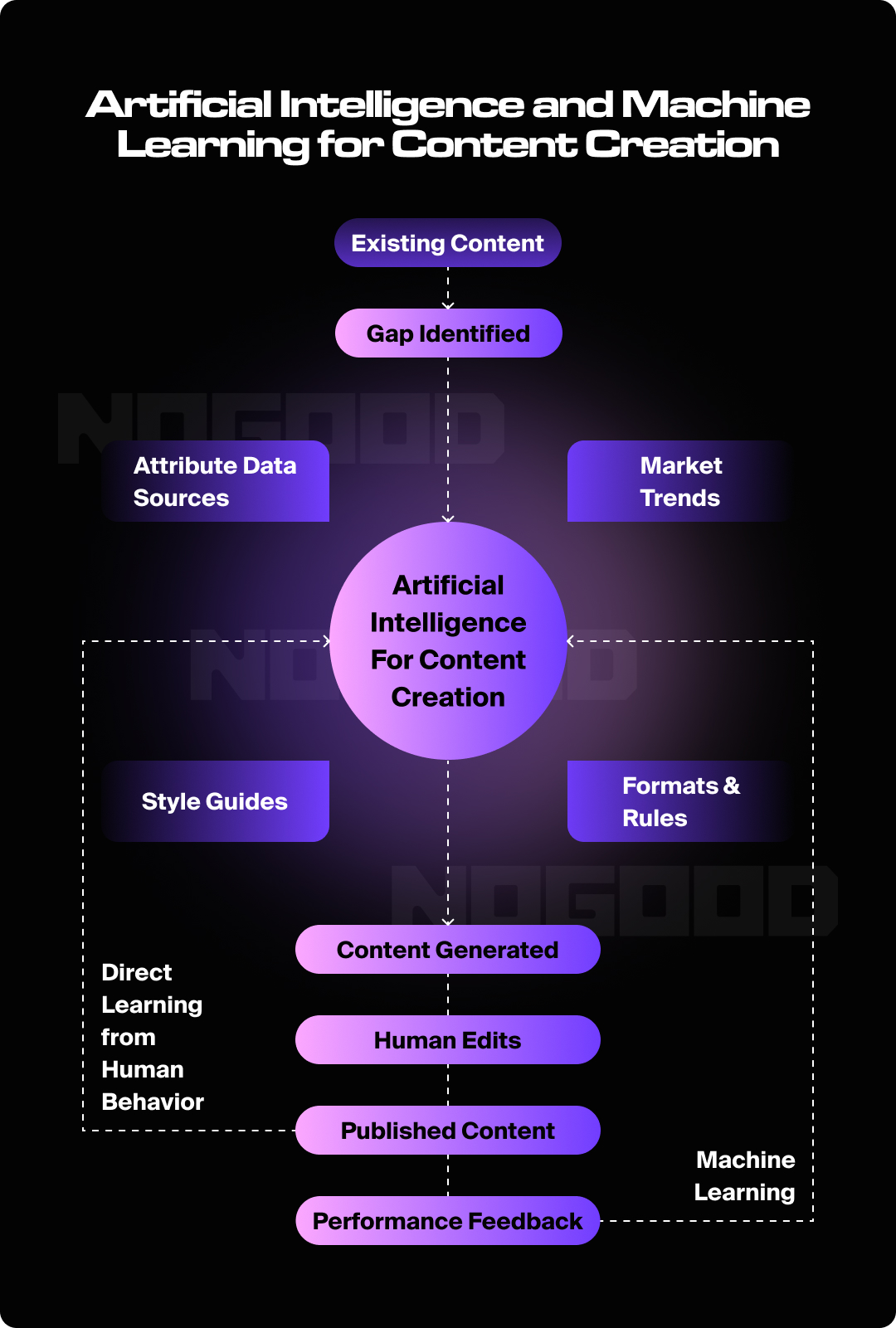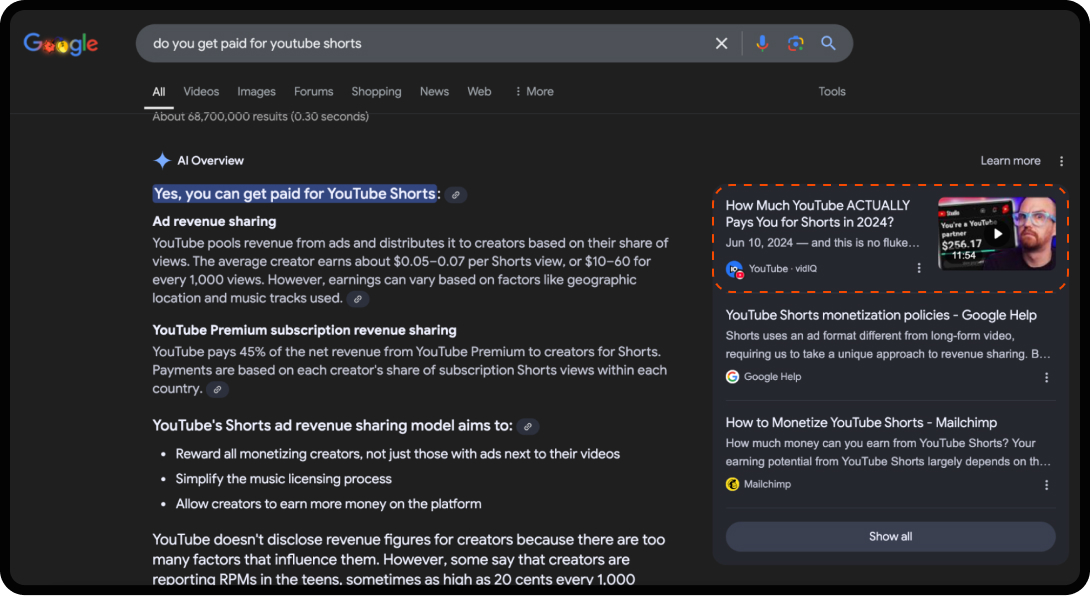SEO is evolving faster than ever, and 2025 is bringing some of its most disruptive changes yet. From AI-authored answers to shifting user behaviors, staying ahead means rethinking how we define visibility, value, and success.

Let’s explore the top SEO marketing trends defining 2025. From AI’s rapidly growing influence on search behavior to the expanding role of visual and voice discovery, understanding these major shifts in the marketing landscape is crucial to staying competitive.
Key Takeaways: 2025 SEO Trends at a Glance
- AI tools are transforming SEO execution. Platforms like Goodie provide real-time insights, automate tasks, and reveal how your brand shows up in AI search experiences like ChatGPT and Perplexity.
- Human-AI collaboration is essential. Blending AI efficiency with human editing ensures your content meets H-E-E-A-T standards and is optimized for both search engines and LLMs.
- Bing optimization is no longer optional. Visibility in Bing directly affects how your brand appears in ChatGPT and other Microsoft-integrated search experiences.
- Search is multimodal. Users are searching with voice, images, video, and text across platforms, and your content needs to be structured and repurposed for every format.
- SEO metrics are shifting. Traditional KPIs like sessions and rankings are less reliable. Track impressions, brand lift, and AI visibility to measure what actually matters.
- Video is already driving organic discovery. From AI Overviews to TikTok and YouTube, video is now a primary content type for both users and search engines.
- Reputation > backlinks. Authority is built through brand trust, social proof, and recognition, not just backlinks. Digital PR and community engagement are rising in importance.
1. AI Tools Are Getting Smarter & More Essential to SEO
AI tools have moved well beyond just content generation. Today’s leading SEO and organic visibility platforms integrate AI capabilities to diagnose both technical and content-related issues in real time, and, more importantly, recommend actionable fixes. These advancements enable marketers to shift from reactive problem-solving to proactive, performance-driven strategies.
This evolution is particularly valuable for small teams or businesses with limited bandwidth. Instead of relying solely on manual audits or expertise, AI can surface opportunities to improve title tags, meta descriptions, site structure, and on-page SEO—faster and with greater accuracy.
Tools like Goodie take this even further by helping brands understand how they’re showing up in AI search experiences like ChatGPT, Gemini, Perplexity, and Google’s AI Overview. Goodie gives you visibility into how answer engines interpret your content, which queries you’re being featured for, and where you’re falling behind. These kinds of insights are critical in 2025, as traditional SEO platforms fall short in addressing the nuances of AI search.

What You Should Do
Audit your current SEO tech stack to identify where AI is (or isn’t) supporting your workflow. If you’re not already using tools like Goodie to monitor your AI visibility, now’s the time to add one to your toolkit. The faster you can surface insights and automate tedious SEO tasks, the more you can focus on strategic growth.
2. AI Search Optimization (AEO) Is Emerging as Its Own Discipline
As AI platforms like ChatGPT, Gemini, Claude, and Perplexity redefine how users discover information, a new branch of SEO has emerged: AEO.
Unlike traditional search engines that display a list of links, answer engines deliver summarized responses, often without requiring a click. These tools use LLMs trained on publicly available content—including yours—to construct answers. That means your content might be cited or paraphrased in an answer engine result even if the user never physically lands on your website.
But AEO isn’t just about showing up—it’s about showing up accurately, helpfully, and often. This requires a shift in how we structure, write, and monitor our content.
AEO success depends on:
- Structuring content in clear, well-labeled sections that answer specific user questions
- Using retrieval-optimized phrasing (direct, natural-language answers to search-like prompts)
- Ensuring your brand is consistently mentioned and accurately represented in LLM citations
- Monitoring where and how your content appears in AI responses, and spotting gaps where it doesn’t
- Creating content that LLMs can confidently cite as trustworthy, expert, and concise
Tools like Goodie are built specifically for this. Instead of just tracking your SERP rankings, Goodie helps you understand which LLMs are surfacing your content, for what queries, and how you compare to competitors in AI-generated results.
What You Should Do
Treat AEO as a dedicated channel within your organic strategy. Identify your top content that aligns with high-intent or question-based queries, and optimize those pages with clear answers, schema markup, and strong H-E-E-A-T signals (more on that in the next section). Use tools like Goodie to benchmark your AI visibility and uncover opportunities to strengthen your brand’s presence in AI search experiences.
3. Human-AI Collaboration Is the Standard for H-E-E-A-T Content
In 2025, producing high-performing content means mastering the balance between AI efficiency and human insight. Since Google’s Helpful Content Update (which has been growing and expanding since its rollout), it’s clear that content created solely by AI, without meaningful human input, often falls short on quality, clarity, and trust.
That’s where the H-E-E-A-T framework comes in: Helpfulness, Experience, Expertise, Authority, and Trust.
Content that satisfies these criteria is more likely to rank well in traditional search and more likely to be cited in AI Overviews, answer engines, and LLM responses. Brands that understand how to blend AI-assisted creation with human editing and perspective are seeing the biggest gains.
We’re well past the point of debating whether AI belongs in content marketing. Instead, the focus is now on how to use it well. From research and outlining to content generation and optimization, AI tools can dramatically speed up workflows, but they still require strong editorial oversight to ensure nuance, originality, and usefulness.
Meanwhile, the quality of your content doesn’t just affect rankings—it also influences how LLMs “understand” your brand. High-quality, well-structured content gives AI systems more accurate material to pull from, increasing your visibility in AI-generated summaries and responses.
What You Should Do
Audit your content workflows and determine where AI tools can add speed or structure and where human input is non-negotiable. Prioritize quality over volume, and consistently apply the H-E-E-A-T principles across your content. Use tools that help you enforce those standards at scale, and create internal checks to avoid publishing anything that feels generic, shallow, or unhelpful.

4. Bing Optimization Is Now Critical for AI Visibility
For years, most SEO strategies revolved around Google, from algorithm updates to SERP rankings. But in 2025, optimizing for Bing isn’t optional anymore. With ChatGPT’s browsing capabilities actively pulling from Bing, your presence in this search engine directly impacts your visibility in AI-generated answers.
Bing isn’t just a traditional search engine anymore—it’s now tightly integrated with Microsoft Copilot, ChatGPT, Edge, and Windows products. As a result, brands that appear prominently in Bing are more likely to show up in conversational and AI search experiences. This isn’t about market share, it’s about influence. If you’re ignoring Bing, you’re missing a growing share of AI-distributed traffic across answer engines and digital assistants.

What You Should Do
Run an audit of your Bing presence using Bing Webmaster Tools. Check which pages are indexed, how you rank for core keywords, and whether your structured data is being interpreted correctly. Then, optimize your content and technical SEO for Bing’s guidelines, especially if ChatGPT visibility is a priority for your brand.
5. Multimodal Search Is Already Reshaping SEO
Search is no longer limited to a typed query in a search bar. In 2025, users are engaging with content across multiple formats, and platforms are evolving to meet them there.
People are using voice, visuals, text, and even screenshots or uploaded documents to find answers. Platforms like ChatGPT-4o, Perplexity, and Gemini are leading the charge in multimodal search, where users can combine different input types and receive layered, nuanced results. Social platforms, too, like TikTok and Instagram, are functioning more and more like search engines, especially for younger audiences.
For brands, this shift means content has to be more versatile and machine-readable across contexts. Structured data, video transcriptions, alt text, captions, and file metadata are all playing larger roles in how content gets surfaced and understood across these interfaces.

What You Should Do
Audit your top-performing content to identify where it can be repurposed into visual, video, or voice-friendly formats. Prioritize adding structured data and descriptive metadata to all media types. And make sure your content is optimized not just for Google’s crawler, but for how LLMs and answer engines interpret and reconstruct information across formats.
6. SEO Metrics Are Shifting in the Age of AI Search
As AI Overviews, answer engines, and zero-click search become the norm in 2025 and beyond, the way we track SEO performance is rapidly changing.
Users are increasingly getting answers before clicking—whether through AI-generated summaries, knowledge panels, or conversational responses. As a result, traditional metrics like organic sessions and even ranking position are becoming less meaningful in isolation.
Being “ranked #1” is no longer the top priority—it’s now about being featured in position zero, cited in AI-generated responses, or mentioned across multimodal result types. At the same time, direct traffic and brand search volume are increasing as users skip intermediaries and go straight to trusted brands.

To keep pace, marketers must expand their KPIs and shift toward visibility, engagement, and brand recall as leading indicators of organic success.
What You Should Do
- Track impressions, click-through rate, and engagement metrics like scroll depth and time on page alongside sessions.
- Monitor branded queries, direct traffic, and referral spikes from non-traditional sources.
- Use AI visibility platforms like Goodie to understand how your brand shows up in tools like ChatGPT, Claude, and Perplexity.
- Reframe reporting conversations internally—the goal is no longer just traffic, but presence, influence, and discoverability across the AI-powered search ecosystem.
7. Video Is Already a Core Driver of Organic Visibility
Video isn’t just an emerging trend—it’s already a central part of how users search, learn, and engage with content in 2025. Whether on Google, YouTube, TikTok, or within AI Overviews, video content is being prioritized across platforms for its ability to deliver fast, digestible value.
Search engines increasingly favor a video format in results, especially when queries are instructional or intent-rich. YouTube videos continue to rank prominently in traditional SERPs, and short-form content from TikTok and Instagram Reels is now appearing more often, especially for how-to queries and brand-related searches. Meanwhile, platforms like ChatGPT and Perplexity are beginning to incorporate video answers as part of their multimodal responses, making video an important format for AI search visibility as well.

In a zero-click environment where attention is limited, video stands out as a powerful tool. It communicates information quickly, builds trust through tone and expression, and gives brands a way to differentiate themselves visually.
What You Should Do
Invest in creating short- and long-form video content that complements your written content and aligns with high-intent queries. Host on YouTube for discoverability, and also consider cross-posting to TikTok, Instagram, or LinkedIn based on your audience. Use VideoObject schema to increase your chances of surfacing in rich results, and don’t skip accessibility features like captions or transcripts, which improve indexability and reach.
8. Reputation Management Is Replacing Traditional Link Building
Backlink building has long been a core tactic for improving domain authority, but in 2025, it’s your brand’s overall reputation that search engines and users are paying closer attention to.
Instead of chasing links for ranking’s sake, SEO strategies are shifting toward reputation signals: consistent brand mentions, authentic engagement, and content that earns recognition from trusted sources. Google’s ongoing refinements to H-E-E-A-T and spam policies make it harder to game the system, but easier for genuinely respected brands to rise to the top.
Reputation management now includes everything from thought leadership and digital PR to user-generated content (UGC), creator collaborations, and social proof across platforms. Additionally, brands are adopting AI tools to monitor brand sentiment across AI summaries, reviews, and forums, not just SERPs.

A strong brand presence now plays a dual role: reinforcing trust for users and providing more context for AI models and answer engines, determining whether or not to surface your content.
What You Should Do
Double down on your brand’s areas of authority. Create content that showcases real expertise and adds value to your community. Encourage reviews and testimonials, engage authentically on social platforms, and look for opportunities to collaborate with credible voices in your industry. Digital PR, influencer mentions, and UGC can all serve as modern trust signals that help both users and AI platforms understand why your brand matters.
Make 2025 the Year You Lead in SEO
SEO in 2025 isn’t just evolving—it’s accelerating. AI search, multimodal discovery, and shifting user expectations are rewriting the rules of visibility. But for marketers who are ready to adapt, this moment offers a real opportunity to lead.
The trends shaping this year are more than predictions—they’re active forces already influencing how your content is found, understood, and engaged with. Whether it’s optimizing for AI Overviews, investing in video, or refining your content with H-E-E-A-T principles, the brands that thrive will be the ones that move early and move smart.
If there’s one constant in all of this change, it’s this: great SEO still starts with delivering value. Stay curious. Stay agile. And build with your audience in mind, always.






